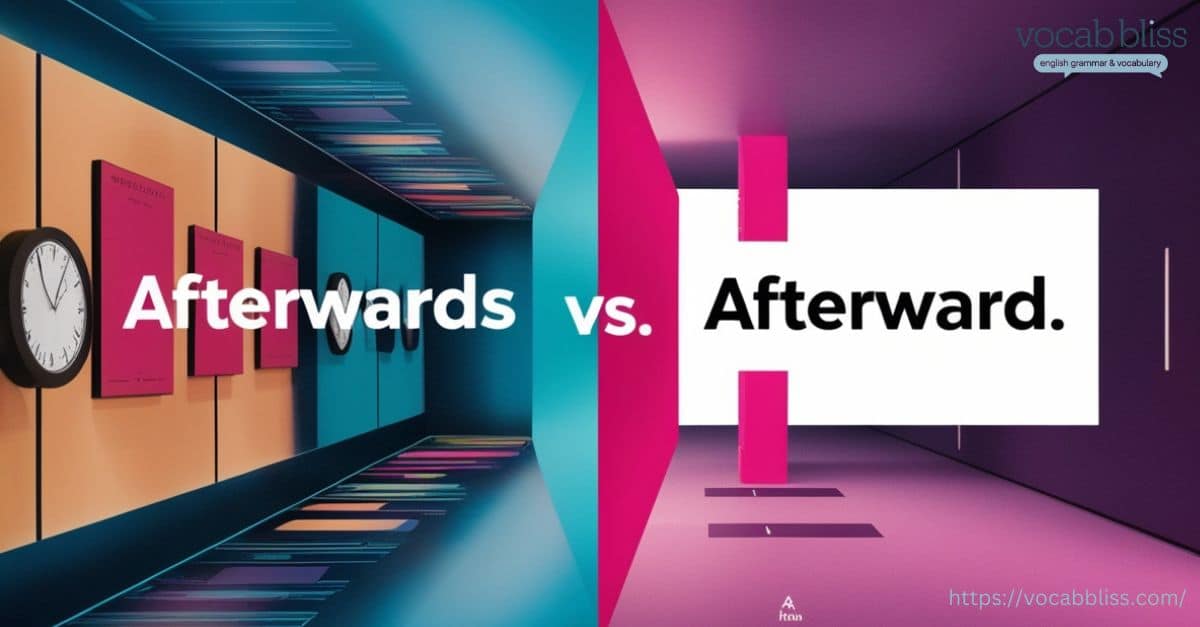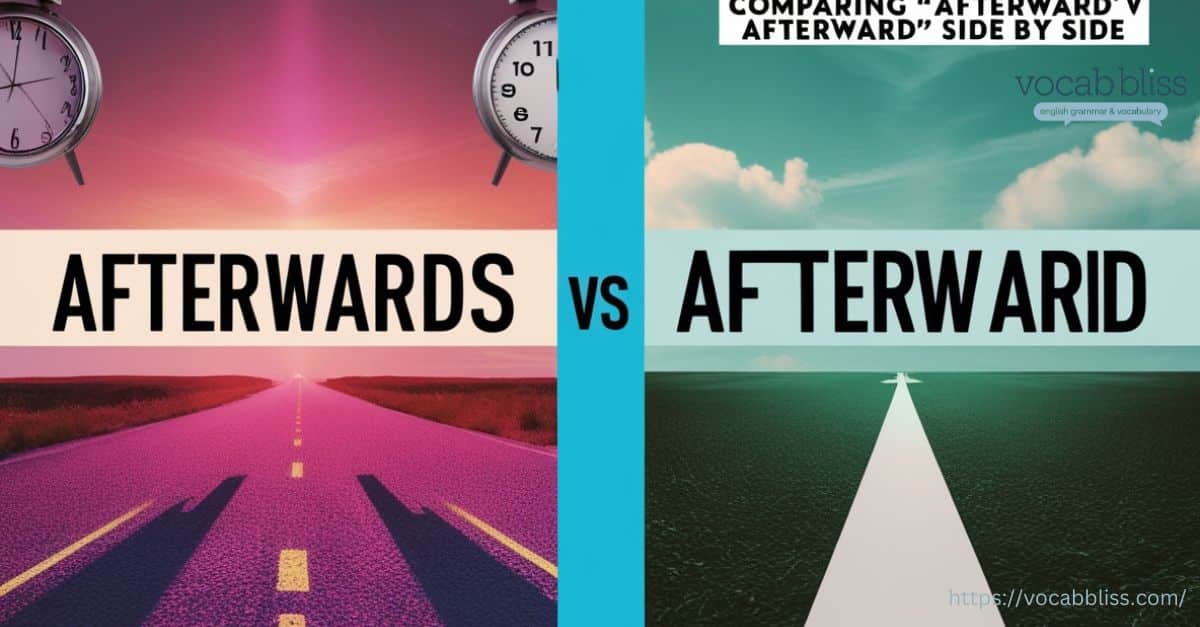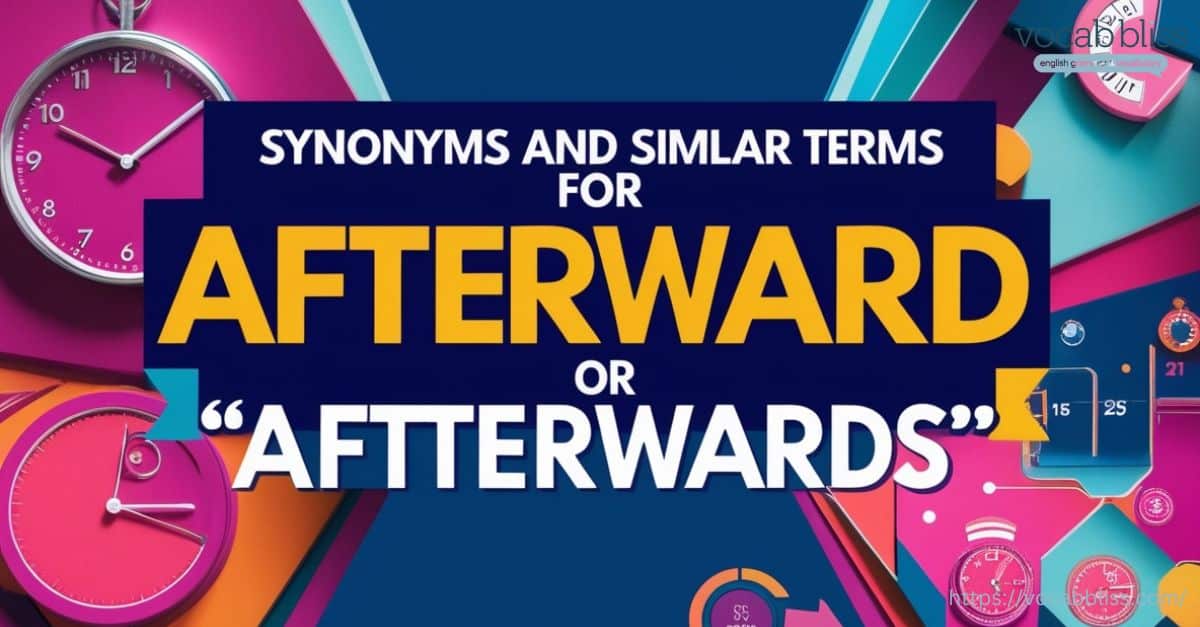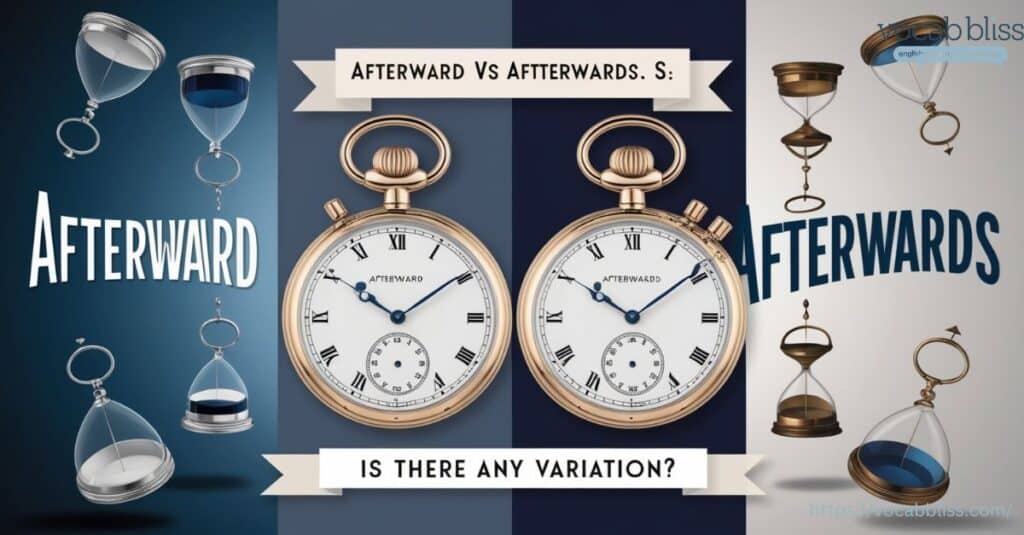Small variations in language can create significant questions, and one such instance involves the words “afterward vs afterwards.” Are they interchangeable? Do they have subtle differences? Does the choice depend on where you live?
This article unpacks everything you need to know about these two words, including their meanings, usage, origins, and how to choose the right one for your context.
Quick Summary
The words “afterward vs afterwards” both mean “at a later time” and are used to indicate something that happens following an event. While they are interchangeable in meaning, their usage often depends on the region: “afterward” is more common in American English, while “afterwards” is preferred in British English. Both terms are grammatically correct, so choosing between them is mostly a matter of personal or regional preference. If you’re looking to add variety to your writing, synonyms like “subsequently,” “later,” or “following” can work as alternatives in many contexts. Ultimately, the decision comes down to the tone and style you want to convey, and understanding your audience’s expectations will help guide your choice.
Discover more: Since vs Sense: Mastering the Difference and Usage
Why Is There Confusion?
The confusion between “afterward vs afterwards” arises primarily because the two words are nearly identical in meaning and only differ by the presence of the letter “s” at the end of “afterwards.” This similarity often leads to uncertainty about whether the words are interchangeable, if one is more correct than the other, or if they have specific rules governing their use.
Key Reasons for Confusion
Shared Definition
Both words mean the same thing: “at a later time” or “subsequently.” Since they serve the same purpose in a sentence, many people wonder why both versions exist.
- Example with “afterward”:
“We attended the lecture, and afterward, we went out for lunch.”Example with “afterwards”:
“The performance was amazing. Afterwards, we congratulated the actors.”
Regional Differences
The primary distinction comes down to geography:
- American English prefers “afterward.”
- British English favors “afterwards.”
For those navigating between these dialects—especially writers and learners of English—it’s natural to feel unsure about which form to use.
Historical Usage

Historically, both forms have been used in English, with slight variations depending on the time and region. The “-wards” suffix aligns with other British English terms like “towards or forwards.” Conversely, American English tends to simplify such words by dropping the final “s.”
- Lack of Formal Rules
Unlike some grammatical distinctions, there isn’t a strict rule that mandates when to use one form over the other. Instead, it’s a matter of regional and stylistic preference. This ambiguity can confuse writers who prefer clear-cut guidelines. - Interchangeable Use in Informal Contexts
In casual conversation or informal writing, people often use “afterward” and “afterwards” interchangeably without considering regional norms. This further blurs the distinction and can lead to inconsistency in usage.
Analogous Word Pairs
This confusion isn’t unique to “afterward vs afterwards.” Similar patterns exist with other word pairs, such as:
- Toward vs Towards
- Forward vs Forwards
- Upward vs Upwards
In each case, the “-s” version is more common in British English, while the simpler form is preferred in American English.
The Core of the Confusion
At its heart, the confusion boils down to this: while both words are correct, the lack of a single, universal standard makes it hard for learners and even native speakers to decide which to use. Understanding the regional preferences and context of your audience is the best way to navigate this linguistic gray area.
What Do “Afterward vs Afterwards” Mean?

At their core, “afterward vs afterwards” share the same definition. Both are adverbs that indicate something happens later or following another event.
Definitions:
- Afterward: At a later time; subsequently.
- Afterwards: At a later time; subsequently.
The difference lies not in meaning but in regional usage, as we’ll explore below.
Examples in Sentences:
- “We finished the game, and afterward, we went out for ice cream.”
- “The party was lovely. Afterwards, we decided to take a walk by the river.”
In these examples, both words serve the same function and are grammatically correct.
“Afterward vs Afterwards”: The Key Differences
At first glance, “afterward vs afterwards” may seem interchangeable. However, their primary distinction lies in regional usage and stylistic preferences. Let’s break it down to help you understand when to use each and why these differences exist.
| Aspect | Afterward | Afterwards |
|---|---|---|
| Preferred Region | American English | British English |
| Tone/Formality | Slightly more formal | Slightly more conversational |
| Frequency | Common in US writing | Common in UK writing |
Regional Preferences
- American English: “Afterward” is standard in the United States and tends to appear in formal and academic contexts.
- British English: “Afterwards” is preferred in the UK and other countries influenced by British spelling conventions, like Canada and Australia.
Pro Tip: If you’re writing for an international audience, either word is acceptable, but consistency is key.
Practical Tips
If you’re unsure which word to use, consider these tips:
- Know Your Audience:
- For American readers: Use “afterward.”
- For British or Commonwealth readers: Use “afterwards.”
- Stay Consistent:
- If you’ve chosen one form in a piece of writing, stick with it throughout.
- Follow Style Guides:
- Academic or professional contexts may have style guides that specify which form to use. For example, the Chicago Manual of Style prefers “afterward,” while Oxford Style Manual leans toward “afterwards.”
- Context Matters:
- In global content, either word is fine as long as the tone and context are clear.
By understanding these differences, you can confidently use “afterward” or “afterwards” while tailoring your language to suit your audience and purpose.
British English Words Ending in “-s” vs American English
The “-ward vs -wards” distinction isn’t unique to “afterward” and “afterwards.” It reflects broader patterns in English spelling. American English often drops the “-s” to simplify words, while British English retains it.
Common Examples:
| Word Pair | American English | British English |
|---|---|---|
| Toward/Towards | Toward | Towards |
| Forward/Forwards | Forward | Forwards |
| Upward/Upwards | Upward | Upwards |
| Backward/Backwards | Backward | Backwards |
Why This Happens
The difference originates from historical spelling practices:
- American English: Noah Webster’s 19th-century spelling reforms aimed to simplify and standardize English.
- British English: Retains older, traditional forms of words.
Understanding these variations helps clarify why certain forms are more popular in specific regions.
Which One Should You Use: “Afterward or Afterwards”?
Deciding between “afterwards or afterward” depends on your audience and the context of your writing.
General Guidelines:
- American English: Use “afterward” for consistency.
- British English: Use “afterwards” to align with local conventions.
- Neutral Contexts: Both are correct, but avoid mixing them within the same piece.
Contextual Considerations:
- Formal Writing: “Afterward” is slightly more formal and often preferred in academic or professional documents.
- Casual Writing: “Afterwards” fits well in conversational or informal writing.
Example Sentences by Context:
- Formal: “The study concluded, and afterward, the data was analyzed.”
- Casual: “We chatted for a while. Afterwards, we went for coffee.”
Examples in Context
“Afterward” Examples
- “The storm passed, and the cleanup efforts began immediately afterward.”
- “She apologized for her mistake and resolved to make changes afterward.”
“Afterwards” Examples
- “We went shopping at the market. Afterwards, we visited a local café.”
- “He was nervous about the interview, but afterwards, he felt relieved.”
These examples show how interchangeable the words are, with regional preferences being the only deciding factor.
Comparing “afterwards vs afterward” Side by Side

| Context | Afterward Example | Afterwards Example |
|---|---|---|
| Casual | “We cleaned the house, and afterward, we relaxed.” | “We cleaned the house; afterwards, we relaxed.” |
| Formal | “The results were announced afterward.” | “The results were announced afterwards.” |
| Narrative | “The hero rescued the villagers and left afterward.” | “The hero rescued the villagers; afterwards, he celebrated.” |
Usage in Different Dialects
- American English:
- “Afterward, the students were given additional resources for study.”
- “The celebration concluded, and afterward, everyone returned home.”
- British English:
- “Afterwards, they discussed the proposal in greater detail.”
- “The announcement was made; afterwards, the crowd dispersed.”
Case Study: Public Speeches
American English Example:
“The president addressed the nation. Afterward, she outlined plans for the next quarter.”
British English Example:
“The prime minister spoke about the budget. Afterwards, he answered questions from the press.”
Practical Tip: Context Matters
When choosing between “afterward” and “afterwards,” consider:
- Your audience’s regional preferences.
- The tone of your writing.
Both words effectively convey the same meaning, so the choice often boils down to stylistic consistency and context.
Synonyms and Similar Terms for “Afterward or Afterwards”

When writing, it’s often helpful to have alternatives for common words to keep your language fresh and engaging. “afterwards or Afterward“ share synonyms that can replace them depending on the context. Here, we’ll explore their closest substitutes and provide examples to help you use them effectively.
Synonyms for Both “Afterwards or Afterward”
The following words and phrases are interchangeable with “afterward or afterwards” in most situations:
| Synonym | Meaning | Example Sentence |
|---|---|---|
| Subsequently | At a later time, following something | “The meeting ended; subsequently, we reviewed the notes.” |
| Later | After a period of time | “She spoke at the event; later, she met with attendees.” |
| Thereafter | After that time | “The law was passed; thereafter, reforms were implemented.” |
| Following | Coming after | “He failed the exam; following that, he studied harder.” |
| Eventually | In the end, after some delay | “They debated for hours; eventually, they reached a decision.” |
| Next | Coming immediately after | “The lecture ended; next, we had a group discussion.” |
| Then | At that time, after something else | “He apologized; then, he offered to help.” |
Context-Specific Synonyms
While some synonyms work universally, others fit better in particular contexts:
Formal or Academic Writing:
- “Subsequently”
- “Thereafter”
- “Following”
Casual or Informal Writing:
- “Later”
- “Then”
- “Next”
Narrative or Storytelling:
- “Eventually”
- “Later on”
- “At some point afterward”
More Specific Alternatives
In certain cases, a more detailed phrase can provide clarity or nuance. For example:
- “Immediately afterward” – If the action occurs right after another.
- “The alarm went off, and immediately afterward, the sprinklers activated.”
- “Shortly afterward” – If the time gap is brief.
- “He left the office, and shortly afterward, the power went out.”
- “Soon after” – A slightly less formal version.
- “They got married, and soon after, they moved to a new city.”
Comparison Table: Synonyms by Tone
| Tone | Synonym | Example Sentence |
|---|---|---|
| Formal | Subsequently | “The data was reviewed; subsequently, a report was prepared.” |
| Formal | Thereafter | “He assumed the position; thereafter, productivity increased.” |
| Neutral | Later | “The storm passed; later, the sun came out.” |
| Neutral | Following | “The announcement was made; following that, applause erupted.” |
| Casual | Then | “We had lunch; then, we went shopping.” |
| Casual | Eventually | “She struggled for years; eventually, she succeeded.” |
Using Synonyms for Style and Variety
Repeating the same word can make writing feel monotonous. Instead, swap in synonyms to maintain a dynamic flow.
Before:
“The ceremony ended, and afterward, the guests moved to the reception. Afterward, they danced and celebrated until late.”
After (with synonyms):
“The ceremony ended, and subsequently, the guests moved to the reception. Later, they danced and celebrated until late.”
Key Takeaways
- Synonyms like “subsequently,” “later,” and “thereafter” add variety to your writing.
- Choose the right alternative based on tone, formality, and context.
- For clarity in timing, phrases like “shortly afterward” or “soon after” work well.
Having a diverse vocabulary allows you to tailor your writing to your audience while keeping it engaging and professional.
Origins of “afterwards vs afterward”
Understanding the history of these words provides insight into their usage today.
Origins of “Afterward”
- Derived from Old English æfterweard, meaning “in the direction of after.”
- The “-ward” suffix historically implied movement or direction.
- American English simplified the word by dropping the “-s.”
Origins of “Afterwards”
- Also rooted in Old English, with æfterweardes as a variant form.
- The “-wards” suffix evolved in British English, reflecting traditional spelling conventions.
These linguistic roots demonstrate that both forms have long-standing legitimacy in English.
A Final Look at “afterwards vs afterward”
Both words are correct and convey the same meaning, but their usage depends on the audience and context.
Quick Recap:
| Aspect | Afterward | Afterwards |
|---|---|---|
| Preferred Region | American English | British English |
| Tone/Formality | Formal/Neutral | Informal/Conversational |
| Common Usage | Writing and literature | Casual speech and media |
For clarity, remember to stay consistent and choose the form most familiar to your readers.
“Afterward or Afterword”?
Before we wrap up, it’s important to differentiate “afterward or afterwards” from “afterword.”
What is an “Afterword”?
- An “afterword” is a section at the end of a book where the author provides additional reflections or context.
- It is a noun, not an adverb, and unrelated to “afterward/afterwards.”
Example:
- “The afterword of the novel gave insights into the author’s inspiration.”
Avoid confusing these terms, as they serve entirely different purposes.
Conclusion
The debate between “Afterwards or Afterward“ is less about grammar and more about geography and style. Both words mean the same thing and can often be used interchangeably. However, understanding their regional preferences—“afterward” for American English and “afterwards” for British English—can help you make more informed choices in your writing.
Whether you’re drafting an essay, composing a business email, or simply chatting online, the key is to consider your audience. Choose the version that aligns with their expectations and ensure consistency throughout your text. With this guide, you’ll not only avoid confusion but also gain confidence in using these adverbs correctly.
When in doubt, remember: “afterward or afterwards”—you can’t go wrong, as long as you keep your readers in mind!
Continue reading:
- Scraped vs Scrapped? Let’s Eliminate the Confusion
- Content vs Context: What marks the difference?
- Batton or Baton: Which One Is Right?
- Posible Or Possible: Which Is The Correct Spelling?

Jorge Phillips is an experienced blogger who writes for Vocab Bliss, sharing his passion for the English language. With a knack for simplifying complex grammar rules and a focus on commonly confused words, Jorge helps readers navigate the nuances of English with ease. His insights aim to make learning engaging and practical.







